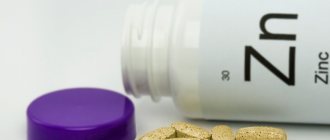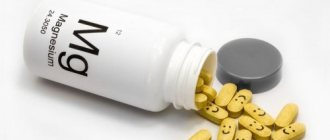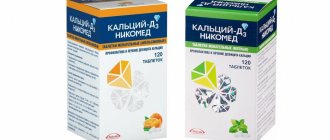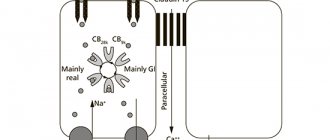Ingredients In two capsules: Vitamin D3 (as cholecalciferol) - 500 IU (125% DV) Calcium (from 80% magnesium oxide, 10% calcium citrate, 10% calcium malate) - 500 mg (50% DV) Magnesium ( from 80% magnesium oxide, 10% magnesium, 10% calcium malate) - 250 mg (63% DV) Zinc (from L-OptiZinc monomethionine) - 7.5 mg (50% DV) Copper (from Copper AAC) - 0.5 mg (25% DV) Manganese (from Manganese AAC) - 2.5 mg (125% DV) Trace Mineral Concentrate - 50 mg
Directions for use: 2 capsules per day, separately, during meals.
Warning: For adults only. Consult your physician if you are pregnant, nursing, taking medications, or have a medical condition. Keep out of the reach of children. The product may change color naturally. After opening, store in a cool, dry place.
Natural dietary supplement “Calcium-magnesium + D3” to maintain vitamin and mineral balance
"Calcium-magnesium + D3" from NOW Foods is a complex of minerals and vitamins necessary for the normal functioning of the body. It contains a wide range of elements that promote the absorption of nutrients, primarily magnesium and calcium. Deficiency of the latter can cause a wide variety of diseases.
Calcium, magnesium and zinc
Have you noticed that after working out at the gym your appetite increases? This is how the body requires nutrients, which it actively used during exercise to replenish the energy balance and maintain the performance of all organs in emergency conditions (and this is how our body perceives physical activity). Food can cover the cost of nutrients only in the case of rare workouts. If you exercise consistently, you cannot do without vitamin-mineral complexes. First of all, you should pay attention to vitamins, calcium, magnesium and zinc, because they are involved in the largest number of biochemical processes. We will talk about the role of the above minerals today.
Maintaining balance is the key to health
Calcium is responsible for the functioning of the muscular system and the musculoskeletal system. Its deficiency leads to brittle bones and muscle weakness. A person suffering from its deficiency is susceptible to various injuries. Even a simple fall can turn into a fracture. This effect is especially pronounced in older people.
It is worth noting that consuming foods rich in calcium does not guarantee its absorption by the body. Therefore, even with proper nutrition, its deficiency can often occur. The solution to the problem is to consume a certain complex of vitamins and minerals. Dietary supplement Cal-Mag Caps 240 capsules contains, in addition to calcium, magnesium, vitamin D3 and a number of other nutrients. This tandem provides the body with the necessary vitamins and microelements. To do this, it is enough to take 2 tablets per day.
The elements included in the preparation “Calcium-magnesium + D3” are also of no small importance for increasing the body’s performance. Magnesium improves stress resistance, helping to cope with negative experiences. In addition, it is directly involved in the transmission of nerve impulses.
Manganese promotes the production of enzymes responsible for the formation of sex hormones. Boron regulates enzymatic processes in the body. In addition, it normalizes the amount of female sex hormones. Copper is responsible for generating energy at the cellular level, and zinc maintains normal acid-base balance.
Magnesium deficiency
Mg is excreted through sweat, so athletes very often face magnesium deficiency. They immediately understand that the level of magnesium from B6 has dropped sharply. Guess how? That's right, magnesium and cramps in the calf muscles or toes are inseparable concepts. This occurs due to decreased energy production in the mitochondria and the development of fatigue.
But such a nuisance as “magnesium deficiency” can also manifest itself through:
- tics;
- abdominal cramps;
- cardiopalmus;
- arrhythmia;
- hypertension;
- dizziness;
- headache;
- anxiety;
- sleep disturbance.
INTERESTING! According to statistics, 60% of adults and 65% of athletes suffer from magnesium B6 deficiency.
In better shape
When a deficiency of vitamins and minerals is identified, it’s time to start replenishing it. It seems like a matter of minutes: in pharmacies there are a huge number of complexes and monopreparations - choose according to your taste. Magnesium is needed, for example, - they will offer it in different price categories from two to three, - you say. And after a while it turns out: the deficit has not gone away, all indicators have remained at the same low level. In fact, the reason was digestibility.
“The issue of digestibility is one of the most pressing for the correction of hypovitaminosis and deficiency of macro- and microelements,”
notes Natalya Kunskaya.
— Before purchasing supplements, first of all pay attention to the form in which the vitamin or mineral is presented. After all, the same magnesium, for example, can be sold in combination with taurine - magnesium taurate, glycine - magnesium glycinate, there is a citrate form of magnesium and others. Each of them has its own advantages and disadvantages, which the buyer sometimes simply does not think about. And the second key point in the absorption of any supplement, and food too, is the state of the gastrointestinal tract. Not everything that is eaten and drunk will be absorbed by the body.
Zinc deficiency
Lack of zinc in the hair first affects the dermis and its derivatives. You can diagnose yourself with hypozincosis if you suffer from:
- hair loss;
- fragility of nails;
- skin rashes;
- peeling of the skin;
- prolonged wound healing.
The following signs indicate that it’s time to look on the Internet for an answer to the question: “Zinc deficiency – what to do?”
- disturbance of the sense of taste and smell;
- decreased visual acuity;
- passivity, depression;
- loss of appetite;
- low immunity;
- poor memory, poor concentration.
Calcium and iron
Unlike magnesium and zinc, the problem of calcium deficiency is not so acute for many.
But if it still exists, you need to act. The most common, but not the best form is carbonate. Digestibility is at the level of 20-30 percent and only with normal or increased acidity of gastric juice. If acidity is low, calcium absorption will not exceed 3 percent. At the same time, calcium citrate boasts several times greater digestibility. Its absorption does not depend on acidity. This form is also considered more preferable for people at risk of developing kidney stones. Calcium hydroxyapatite is also available on the pharmaceutical market - biochemically it is the closest form to our body; it also contains phosphorus. There is also chelated calcium: it is well processed and transported into tissues, while it does not interfere with the absorption of other macro- and microelements and is considered the best form. It is important to note: any of the varieties is almost not absorbed if the body is deficient in vitamin D and magnesium. Taking calcium in this case is not only pointless, but also dangerous. Iron is also considered an important microelement, the deficiency of which seriously affects health. The problem is especially pressing for women - they lose it during menstruation, and sometimes it is not easy for the body to replenish the supply. Iron supplementation is also often prescribed for low hemoglobin, which, according to nutritionists, is not very effective:
— In fact, taking iron does not always raise hemoglobin. And often the cause of the problem is not at all the lack of this particular microelement. Iron can enter the body in sufficient quantities, but will not be absorbed due to a deficiency of protein or so-called cofactors for its absorption: vitamins B12, B9, C, zinc, copper, manganese and others. However, doctors still continue to prescribe large dosages to patients without understanding the problem comprehensively. Therefore, positive dynamics in therapy do not occur or they persist for a short time.
Returning to replenishing iron deficiency, the best forms are considered to be pyrophosphate and bisglycinate. Both, in most cases, have no side effects from the gastrointestinal tract and are well absorbed, especially if taken on an empty stomach.
Who needs vitamins, calcium, magnesium, zinc?
Supplements based on magnesium, calcium and zinc sulfate must be taken when:
- active training;
- frequent stress;
- abuse of alcohol, coffee or carbonated drinks;
- smoking;
- drinking chlorinated water;
- vegetarianism (the best sources of magnesium with B6 are meat dishes);
- complete rejection of dairy products;
- strict diets (by limiting yourself in calories, you limit yourself in vitamins, calcium, magnesium);
- osteoporosis;
- presence of diabetes mellitus or liver disease;
- chemotherapy;
- the appearance of the first symptoms of calcium, magnesium or zinc deficiency;
- taking hormonal medications, in particular oral contraceptives;
- problems with menstruation (especially when it comes to amenorrhea);
- menopause;
- over 40 years of age (magnesium sulfate is absorbed more slowly, and Ca is generally washed out in mature and elderly people);
- significant loss of water (for example, in the summer, when a lot of magnesium and B6 are lost through sweat, with constant use of diuretics, during vomiting);
- pregnancy;
- breastfeeding.
Indications for use
For preventive purposes, the use of the dietary supplement “Calcium-magnesium + D3” is recommended for everyone without exception. Regular use of the drug, according to reviews, will provide the body with the necessary amount of vitamins and microelements. But there are conditions in which the supplement turns into a vital necessity. This:
- stress;
- chronic fatigue syndrome;
- osteochondrosis;
- muscle cramps;
- osteoporosis;
- inflammatory processes in bone tissue;
- heart failure;
- allergy.
The drug "Calcium-magnesium + D3" is very important for older people. In old age, bones become more fragile, and even a minor blow can lead to a fracture. Calcium deficiency does not allow tissues to heal normally, as a result of which a person who was still vigorous yesterday has problems with movement.
"Calcium-magnesium + D3" is recommended for pregnant and nursing mothers. During this period, the body experiences an increased need for vitamins. If it is not satisfied, a variety of problems will arise. The lack of this element affects the health of nails and hair, and the condition of bone tissue deteriorates.
Teenagers and children also need calcium. It is directly involved in the formation of bone tissue and joints. Its deficiency negatively affects the overall development of the body. Therefore, for prevention purposes, it is recommended to take special medications that contain this element.
“Calcium-magnesium + D3” is not a medicine, but a dietary supplement used to enrich the diet in order to prevent a number of disorders in the functioning of organs and their systems.
Zinc
Negative consequences are observed with a lack of zinc due to reduced intake from food or impaired absorption from the intestines, as well as with severe and prolonged stress. The body reacts to zinc deficiency by malfunctioning many enzyme systems, which ultimately leads to disruption of the metabolism of nucleic acids, proteins, lipids and carbohydrates, activation of oxidative processes in cells with an increase in the formation of peroxides and free radicals. This, in turn, increases damage to cell membranes, the most vulnerable being epithelial, bone and germ cells. Clinical signs of zinc deficiency include: stunted growth, impotence, inhibition of insulin synthesis, and delayed wound healing. Zinc deficiency interferes with insulin activity.
Calcium
Calcium (Ca) is a vital intracellular cation, the third in quantitative content in the body (the mass of the element in the human body can reach one kilogram). The main amount of calcium is contained in osteocytes (bone cells), slightly less in muscles, and a small percentage is found in some other tissues.
Calcium ensures the maintenance of various physiological processes in a healthy body:
- is the “building material” for all bones of the human skeleton;
- responsible for the process of contraction of smooth muscles (myocardium, airways, bladder and digestive tract);
- participates in the regulation of blood vessel tone;
- regulates tension-relaxation processes of striated skeletal muscles;
- part of the blood coagulation system;
- responsible for the normal excitability of cells in the nervous system.
Our body constantly monitors the content of macronutrients in the blood, because both an increase and a significant decrease in the concentration of calcium ions pose a threat to normal functioning. To maintain the dynamic balance of the element, the following are involved: the digestive system, bone cells (osteoblasts, osteoclasts and osteocytes), blood, kidney cells.
The daily requirement of a healthy adult is approximately 1.2 grams of calcium, which is the norm of the element intake from food.
Foods rich in calcium traditionally include:
- cottage cheese, cheese and other dairy products;
- egg yolk;
- animal cartilage;
- soft bones of some types of fish (sardines, salmon);
- green leafy vegetables.
But you need to know that in order to achieve a sufficient concentration of calcium in the body, the macroelement must be metabolized into an acceptable form to enter the blood. The process of absorption of the ion in the intestine is significantly better and more active with the participation of vitamins D2 and D3 when taken together with protein foods, magnesium, phosphorus and iron. But this process can worsen during exposure to stress factors, with a lack of vitamin D, when consumed on an empty stomach, or when taken simultaneously with food containing phytic acid and oxalates.
Beauty vitamins
True beauty comes from within. You can improve your appearance indefinitely with the help of cosmetic procedures and expensive cosmetics, but this effect will be temporary if the body does not have enough strength and energy to maintain health and natural beauty. Where do these forces come from? From a balanced diet with sufficient vitamins and microelements, good sleep, adequate physical activity. We asked Vera Viktorovna Serezhina, senior physician at the Doctor Q service of the LabQuest laboratory, about the levels of which microelements need to be monitored.
The role of vitamins and microelements in our lives
F Strong nails, smooth and glowing skin, shiny hair are only visible manifestations of a sufficient supply of vitamins and minerals to the body. Their role is much more important. Thanks to various microelements, the functioning of internal organs is normalized, nerve impulses are transmitted, hormones and biologically active substances are secreted. If a person’s diet is monotonous or lacks certain food groups, a deficiency of several vitamins and microelements develops at once. In this case, the symptoms can be very different, i.e. It is almost impossible to make an accurate diagnosis without research, and taking multivitamins for “prevention” is a useless idea, since there are special regimens for taking certain vitamins.
The most important “vitamins of beauty and health”
The seven most important vitamins and microelements, the lack of which can lead to serious consequences for the body and immediately affect the appearance: calcium, magnesium, phosphorus, vitamin B12, folic acid, iron and zinc. They are found in varying proportions in almost all food products. But in order for the body to receive these substances in sufficient quantities, it is necessary to follow a nutritious and varied diet.
Calcium
Calcium metabolism in the body is regulated by the thyroid and parathyroid glands. Excess of this microelement is excreted by the kidneys. It is present in greatest quantities in bone tissue and is essential for healthy nails, teeth and hair.
The functions of calcium in the body are multifaceted: from maintaining the strength of bones, teeth, beauty of hair to the soft functioning of the intracellular structures of cells - the enzymes that it regulates, and has anti-inflammatory and anti-allergic effects. The calcium requirement per day in adults is 0.8–1 g per day. Calcium requirements increase in pregnant and breastfeeding women and athletes.⠀
Food sources of calcium include: dairy products, green vegetables (broccoli), nuts and sesame seeds, calcium-precipitated bean curd.
Magnesium
The beneficial effects of magnesium extend to all systems of the body: calms the nervous system and improves sleep quality, relaxes the smooth muscles of blood vessels, allowing blood to circulate freely throughout the body, relaxes the bronchi, has a beneficial effect on metabolism, reducing the risk of type 2 diabetes and atherosclerosis, relieves women from symptoms PMS.
The first symptoms of a lack of this microelement will be sensations of “fly crawling” and tingling in the skin and increased excitability, with a tendency to convulsions.
Magnesium is one of the most important elements that is involved in the formation of nerve impulses in cardiac tissue and is responsible for the normal functioning of the nervous system. The first thing that suffers when there is a deficiency of magnesium in the body is mood. Irritability, neuromuscular tics, and convulsions appear. With a lack of this microelement, skin tone decreases, stretch marks form more easily, the condition of hair and nails worsens, appetite increases, which leads to a set of extra pounds.
Magnesium deficiency can occur due to low consumption of it in food or due to its non-absorption in the intestines in diseases of internal organs and painful conditions of the gastrointestinal tract, such as gluten intolerance. This microelement is found in the greatest quantities in vegetables, fruits and cereals. But due to the ubiquity of refined and fast food, magnesium consumption has decreased by almost 50% over the past few decades.
Sources of magnesium will be: wholemeal bread, cereals, legumes, green vegetables, dairy products.
The norm for magnesium content for adults is taken to be 4 mg/kg. This amounts to an average of 350 and 280 mg/day for men and women, respectively.
Phosphorus
Phosphorus plays an important role in mineral metabolism in bone tissue and ensures proper cell growth. Sufficient phosphorus content in the diet has a beneficial effect on the condition of the skin, nails and hair become stronger and look healthy.
Living matter has a huge need for phosphorus. DNA and RNA have phosphorus in their structure, energy molecules ATP, cell membranes consist largely of phospholipids (found in nervous tissue, involved in the delivery of fats, fatty acids and cholesterol). Phosphorus acts as an assistant to the work of various enzymes and, in combination with calcium, forms hydroxyapatite, the main inorganic compound of bone (50% of bone mass, 96% of tooth enamel). Phosphorus deficiency in healthy adults is possible when the phosphorus content in food is low. At the same time, the excretion of phosphorus by the kidneys decreases, but the excretion of calcium, magnesium, and potassium, which comes from the bone, increases. This causes weakness, anorexia and bone pain.
The causes of phosphorus deficiency are excess body weight, which increases the need for intracellular phosphorus, insufficient absorption of phosphorus in the small intestine due to its pathology, in diabetes mellitus a lot of phosphorus is lost due to heavy diuresis, long-term administration of phosphate-binding antacids (Renny, Gastal, Maalox, etc.). d).
Phosphorus is widely distributed in foods. Average daily phosphorus intake is approximately 1500 mg for men and 1000 mg for women.⠀
Food sources that contain a lot of protein (meat, milk, eggs and grains) are also high in phosphorus. The phosphorus content in food is approximately:⠀ 60% - from milk, meat, poultry, fish and eggs;⠀ 20% - from cereals and legumes;⠀ 10% - from fruits and juices;⠀ 3-4% - from such drinks like coffee and tea;
Vitamin B12
The passage of impulses through nervous tissue, as well as normal hematopoiesis, are impossible without vitamin B12. With its deficiency, a characteristic disease develops - B12 deficiency anemia, hyperpigmentation and premature aging of the skin begins. When vitamin B12 and vitamin C interact, active oxygen molecules are formed that have anticancer and fungicidal (antifungal) properties.
Chronic vitamin B12 deficiency leads to weakened immunity and chronic fatigue. The risk group for vitamin B12 deficiency includes: vegetarians and vegans, patients with diseases of the stomach and intestines, taking proton pump inhibitors (omeprazole, OMEZ), H2 blockers of histamine receptors (ranitidine, etc.), patients with diabetes mellitus and other diseases, long-term users of Metformin.
Most of the vitamin is present in red meat and some types of legumes.
Folic acid
Every pregnant woman takes this vitamin in the first trimester in order to reduce the likelihood of having a baby with pathologies of the nervous system. For everyone else, the vitamin is useful for normalizing the activity of the nervous system, strengthening nails and hair. Folic acid enters the body with food. It is found in beans, parsley, lettuce, cabbage, tomatoes, spinach, asparagus, liver, kidneys, meat, mushrooms, and yeast.
Iron
The first manifestation of iron deficiency in the body is anemia. According to statistics, 40% of women of reproductive age have varying degrees of anemia. The female body especially suffers from iron deficiency during pregnancy and lactation. Hair loss, nervousness, dry and flaky skin can all be a consequence of iron deficiency.
Iron in the body is involved in numerous redox reactions and is necessary for many enzymes and proteins, and is necessary for the transport of oxygen and carbon dioxide in hemoglobin.⠀
Symptoms of iron deficiency may initially be so subtle that their duration is difficult to date. Patients may not be aware of the presence of the disease; deviations from the norm may be discovered accidentally during a blood test, for example.
If a deficiency of moderate or moderate severity appears, symptoms such as:
- fatigue, increased fatigue and pallor, - shortness of breath on exertion and palpitations, - geophagia (perverted taste preferences) is often observed: eating clay, starch, salt, cardboard and ice, and it is not always corrected with iron supplements, - glossitis (inflammation of the tongue , with atrophy of the papillae of the tongue and decreased sensitivity), - seizures in the corners of the mouth (angular stomatitis), - with chronic iron deficiency, nails can become brittle, dull, brittle and subsequently have the shape of a spoon, - swelling of the optic nerve and decreased vision ⠀ Dietary sources of iron: mammalian meat - beef, poultry or fish, and least of all - eggs, milk and cereals. Iron is poorly absorbed from wheatgrass, legume butter, spinach, lentils and beet greens, all foods high in phytate.
Zinc
Zinc is considered the main microelement of the reproductive system and is also involved in the regeneration of skin cells, hair, and nails. For men it is important for the maturation of sperm, and for women - for the formation of an egg.
A lack of zinc leads to poor tissue regeneration and growth, loss of hair color with the appearance of gray hair, focal hair loss, lowers mood, and causes drowsiness.
Zinc deficiency occurs with intestinal diseases, often of an inflammatory nature, in which the absorption of zinc is impaired, with alcohol abuse, with diabetes, in which the excretion of zinc is increased, resulting in a decrease in its amount in the blood.
A balanced diet aimed at replenishing this element from food products, as well as treating diseases that could lead to its deficiency, will help cope with a lack of zinc in the body. ⠀ High zinc content in the following products: meat, liver, eggs, seafood, whole grain bread, legumes, nuts.
Lack of vitamins and microelements develops much more often than hypervitaminosis. However, such a condition is possible if a person takes complex vitamin supplements to the diet for a long time and without indications. For example, excess iron in the body leads to a disease - hemosiderosis, one of the manifestations of which will be the appearance of “rusty-colored” pigment spots on the skin. The danger of hemosiderosis is that excess iron, in addition to the skin, is deposited in the internal organs, disrupting their functioning.
Before adding any vitamin supplement to your diet, it is important to check the current level of trace elements and vitamins in the blood and select a drug based on the body's needs.
Author: Serezhina Vera Viktorovna Senior doctor of the service Doctor Q Laboratory LabQuest
Magnesium
Magnesium (Mg) is another vital intracellular cation in this complex. Its content in the body is much lower compared to calcium - about 25-30 grams. Similar to calcium, the maximum amount of magnesium is found in bones, then in decreasing order in muscles and other tissues and organs.
The macroelement is a cofactor for many enzymes (about 300), the daily intake from food is 0.5-0.9 grams.
The range of metabolic processes involving magnesium includes:
- regulation of tone and contractile activity of skeletal and smooth muscles;
- influence on excitation-inhibition processes in the nervous system;
- maintaining the functioning of the respiratory center.
In natural products, the highest magnesium contents are: cereals, rice, buckwheat, legumes, sea fish, lettuce and spinach.






